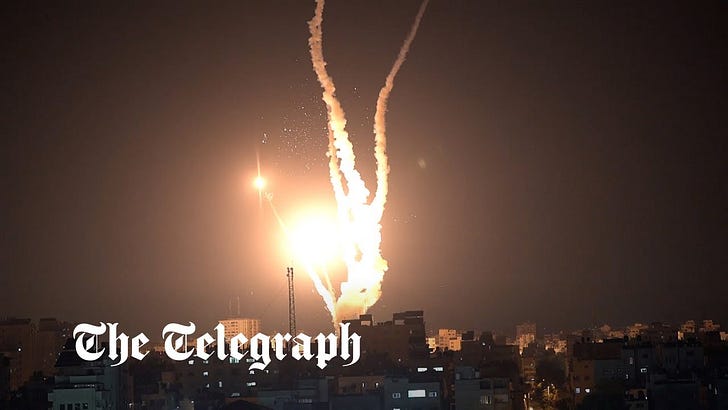On May 2 Khader Adnan, a senior leader of Palestinian Islamic Jihad who was in Israeli custody, died after an 86-day hunger strike. Israel did not kill him; he had been offered treatment but had refused it.
Nevertheless, Islamic Jihad reacted to Adnan’s death by firing 100 rockets into Israel from Gaza in 24 hours. Israel, in turn, attacked some military targets of Hamas—the terror group that rules Gaza and is supposed to be in charge of what happens there. Islamic Jihad is a smaller Gaza-based terror group and—unlike Hamas, which has a more complex relationship with Iran—a proxy of Iran pure and simple.
And so matters seemed to stand, with most Israelis seeing the Israeli response to the 100 rockets as gravely inadequate.
Until, in the predawn hours of Tuesday, May 9, Israeli airstrikes killed three top Islamic Jihad commanders in different locations in Gaza within a few seconds.
Although it took the shellshocked Islamic Jihad some time to respond, late on Wednesday it started firing rocket barrages at Israel—and a miniwar erupted that lasted until an Egyptian-mediated ceasefire took hold on Saturday, May 14.
According to official statistics of the IDF (Israel Defense Forces), during the miniwar Islamic Jihad fired 1,468 rockets and mortars at Israel; 95% of those headed for populated areas were shot down by Israel’s Iron Dome air-defense system. Altogether, these rockets killed two people—a 90-year-old Israeli woman and a Palestinian man from Gaza working at an agricultural building site in Israel. A number of Islamic Jihad’s rockets landed errantly in Gaza and killed at least four Palestinians there.
Israel, for its part, hit 422 Islamic Jihad targets in Gaza, killing 21 terror operatives including a total of six top leaders. Possibly 10 civilians, reportedly including women and children, were killed in Israel’s initial coordinated strike on the three Islamic Jihad commanders on Tuesday, May 9.
Following are some common questions raised about this miniwar, with attempts to answer them.
Why did Israel kill civilians?
Veteran Israeli military analyst Ron Ben Yishai notes that the three commanders “posed an immediate and clear threat to Israeli civilians, [and] chose to stay in the presence of families and other civilians, despite knowing that they were being targeted by Israel.” The fact that, apparently, no other civilians were killed in Israel’s strikes on 422 targets in densely populated Gaza reflects the fact that Israel, when possible, takes extraordinary measures to avoid civilian casualties.
Colonel Richard Kemp, who was a commander of British forces in Afghanistan, states that the IDF
is known by all Western military commanders to be more effective than any other force in the world in preventing the deaths of civilians in enemy territory…. The Gaza terrorists…have a deliberate policy of using human shields—a war crime. Not least, Islamic Jihad commanders keep their wives and children close to them as proper military commanders would wear their body armor and helmet.
Why didn’t Hamas step in on Islamic Jihad’s side?
On that question there are different assessments in Israel. Some say Hamas views Islamic Jihad as a nuisance that flouts Hamas’s power and didn’t mind seeing Islamic Jihad get hit hard by Israel. More likely, Hamas—since its 2021 war with Israel, in which it took a drubbing—is deterred.
Furthermore, Israel, making use of a carrot-and-stick policy, is now allowing 17,000 Gazans per day to cross the border and work in Israel. Hamas—as Michael Oren, former Israeli ambassador to the US—points out, is well aware that those workers’ salaries are a great boon to Gaza’s economy, and will be lost if Hamas again launches hostilities at Israel. Hamas, to be sure, is a jihadist organization ideologically committed to Israel’s destruction, but it is also responsible for Gaza and has to make choices.
Why doesn’t Israel just reconquer Gaza?
Militarily, Israel is unquestionably capable of doing so—but it would take an operation lasting months in which not only terrorists but large numbers of Israeli soldiers, as well as Gazan civilians, and some Israeli civilians too, would be killed.
Along with the fact that, justly or not, Israel would quickly lose US support amid the death and mayhem, the “prize” for such a campaign would be a small enclave densely populated by more than two million mostly deeply, in some cases murderously, hostile Muslim Arabs that Israel would then—with a huge outlay of resources—have to administer and police in all regards. Rationally speaking, Israel already has more than enough challenges facing it without adding that one to the list.
Did this miniwar achieve anything?
Yes. While Israel fought a terror group numbering no more than ten thousand, it displayed amazing prowess particularly in the coordination between its Shin Bet intelligence service, ground command, and air force, enabling it to “see” everything happening in Gaza and carry out ultra-precision strikes on a wide variety of targets. It also demonstrated that, despite the recent domestic dissension in Israel, its population is as capable as ever of showing great unity and resilience in a crisis.
This does not mean, of course, that Israel will have no more armed confrontations with Islamic Jihad, Hamas, or both. It does mean Israel is conveying a deterrent message of extraordinary technological and operational capability throughout the Middle East and all the way to Tehran, as it wisely chooses to manage the Gaza issue judiciously instead of trying to “solve” it through sheer, counterproductive force.




